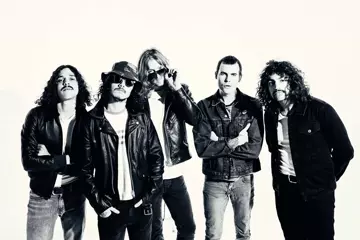 Otep
OtepHydra, Otep's sixth full-length, and third for Victory Records, was released in January with a publicity push that touted the collection of dark, poetic anthems as being the band's final album. A press release explaining the album's concept, one that revolves around “a girl corrupted by the world, corrugated by evil, ripped away from the golden, molten elixir of creativity, and abandoned on the placid, jagged rocks of a cruel and barbaric island where the rats poison themselves,” also stated that “this will be my last album”, with subsequent media also referring to their upcoming tours as being the last.
At the time of the interview, Otep were near the end of a US run in support of Hydra. Exclaiming that the shows had been “wonderful, fantastic”, one wonders if Shamaya is at all saddened by the prospect that the tour may be her last on American soil.
“Well I recently lost my companion animal – she died in January,” the outspoken animal rights activist says of her dog. “That experience... she had a brain tumour, although she was expected to survive – it was operable – she died a few days before surgery. That final defeat of someone who didn't know what was wrong with her, you could see physically that she was in pain, and to see something that was so brave, so strong, and she fought every moment to live, to see her lose that battle, it really kind of taught me to live in the moment. So right now that's what I'm doing.”
So there may be more albums to come after Hydra?
“I'm living in the moment man. Right now in this moment, I'm talking to you on the phone. No one knows what the future will hold. Art is a large part of what I do, and I'm not going to stop creating.”
Don't miss a beat with our FREE daily newsletter
In the lead up to the album's release, Shamaya went all out in her verbal assault against music piracy, even partially blaming it for her supposed forthcoming withdrawal from the industry. While to some it was seen as simply speaking the harsh truth – that most people are stealing music without sound justification – other commentators derided her rants as childish and unrealistic. Did bringing these issues further to light help or hinder the sales of Hydra?
“Most of our fans – dedicated fans, our real fans – they do buy the albums, and we're very grateful for that,” Shamaya offers. “I think there were some people who agreed with it, and some people who disagreed with it, and maybe I was attacking them, but I have to defend art, I have to defend writers. We play with local bands every single night and I look at those bands and wonder what kind of future they have, because the music industry has changed so much. A lot of these bands aren't going to have what they deserve out of music. It's just not going to happen to them because of what has happened to the music industry.
“Fans aren't all to blame – the music industry, the record companies are culpable in this as well. They didn't invent iTunes. Apple invented iTunes. The record companies fought that. The music industry itself has been so cannibalised by everyone, and there are those of us in the underground bands who have been in the underground our entire career, who love the arts so much that we go down with the ship even when it's burning, you know?”
She has no shortage of things to say on the matter, and requires very little prompting to continue.
“People that defend pirating... whoever said art was supposed to be free? Whoever said that music should ever be free? Picasso certainly didn't, Jimi Hendrix certainly didn't, Kurt Cobain didn't, Rage Against The Machine – they still sold their records. System of A Down, they sold their records. The reality of making music is that a label invests in studio time, in rehearsal time, they pay producers, equipment people and technicians to come in and make sure we get the right sound. This is all very minimised now. This is how it used to be. That investment has to be paid back, and that investment isn't paid back through touring, but now labels are taking a percentage of merch sales on tour, and that used to be bands' livelihoods. That's how they made a living. Most bands now have to work second jobs to just support their music. I would suggest to anyone who says that it's not affecting the music industry – what is it that you love? What is it that you adore? What is it that you have worked so hard on? What if I just walked in and stole it from you? What if a painter painted something and put it on the wall, and someone just walked into the gallery and walked out with it? You'd call that a theft.
“It's not fair to do that to musicians. What's going to happen is that smart musicians move on, they leave the industry or leave the genre. They can make a living, not a good living, but I can feed myself, clothe myself and pay my rent if I have a laptop and make digital music. That's what's happened to the music industry, when very little cost that goes into it.
“It's a shame that people like me have to defend themselves against their own fans. We're lucky in that we have really great fans who do buy our music, and do buy our records, but there's a great deal more people who steal it instead. In these days you have Pandora, Spotify, YouTube even, where you can listen to the music for free and not have to buy it, and the band still gets paid for it – it's pennies, but it's something – but a lot of people still go out and download those files because it makes them feel like they're helpful or something, but in reality they are handicapping all the bands that they love.”
It's a dark time of tumultuous change, at least for many musicians that came from major label backgrounds. At the end of the day the message is still more important than the money, but perhaps without the money, that message is harder to get out there.
“Music is such a powerful force. It's what we turn to in times of great tribulation. When our heart is broken. When disaster strikes,” Shamaya implores. “People turn to music and console themselves in song. That song costs 99 cents. That's not much for something that's going to stay with you for the rest of your life. For some people a Picasso painting is worth millions of dollars, but a song is equally valuable to so many people, but they don't have to pay a million dollars, they have to pay less than a dollar.”
Otep will be playing the following dates:
Thursday 25 April - The Hi-Fi, Sydney NSW
Friday 26 April - The Hi-Fi, Melbourne VIC
Saturday 27 April - The Hi-Fi, Brisbane QLD















